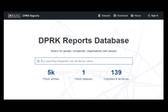CPF Technical Assistance Programme
This programme focuses on supporting countries in countering illicit financial activities associated with proliferation activity and leveraging our research and expertise.
The Centre For Finance and Security (CFS) has been at the forefront of addressing the challenges tied to countering proliferation financing over the last decade. Our mission is to support countries meet their international obligations and take practical steps to strengthen the implementation of global standards in this critical area.
Proliferation financing is no longer just about screening sanctions lists—it requires a rounded understanding of a range of activities that support proliferators’ revenue raising and procurement. With a foundation built on groundbreaking publications, the CPF Training Assistance Programme equips financial institutions and government stakeholders with timely, actionable insights to understand typologies, bolster defences and stay ahead of emerging threats.
Aims and objectives
Proliferators exploit diverse methods to finance their weapons of mass destruction (WMD) programmes, including illicit activities through front companies, the exploitation of IT workers for illegal labour, and the misuse of emerging technologies like cryptocurrencies. Tackling this global challenge requires a multifaceted approach.
The primary goal of the CPF Technical Assistance Programme is to empower stakeholders worldwide with advanced research and practical solutions. Recognising that effective countermeasures hinge on strong collaboration between governments and the private sector, we focus on building partnerships, sharing expertise, and developing innovative strategies to tackle the dynamic challenges of proliferation financing across three key areas.
1. Training Assistance
We bring together public and private sector stakeholders, providing them with the knowledge and skills through roundtable discussions, interactive workshops, and training to effectively identify and mitigate proliferation financing risks.
2. National and Sectoral Risk Assessments
We offer clear direction to help stakeholders conduct comprehensive national and sectoral risk assessments. This includes defining key concepts, typologies, and activities, as well as covering the fundamentals of risk assessments, how to leverage past exercises, who should be involved, and which sectors should be included.


3. DPRK Reports Database
This database offers open access to high-quality, structured data from the United Nations North Korea Panel of Experts Reports, covering the period from 2009 to 2024 and including 7000 entries, to provide detailed insights into North Korea's proliferation financing networks.
Project impact
In the years since the launch of the CPF Technical Assistance Programme we have successfully conducted in-country and virtual trainings in over 80 countries and territories worldwide.
Our Guide to Conducting a National Proliferation Financing Risk Assessment is a key resource recommended for jurisdictions undertaking proliferation financing risk assessments.
The RUSI Implementation Guide and Model Law has been endorsed by the Asia-Pacific Group on Money Laundering (APG), a regional body representing 41 member states. Our ongoing collaboration with the APG and other FSRBs reflects our commitment to fostering regional and international cooperation.
We have supported governments, industry associations, and private sector organisations globally, strengthening their capacity to counter proliferation financing. Our research and insights are regularly featured at international conferences and summits, promoting knowledge-sharing and best practices. Through innovation, expertise, and collaboration, our CPF Technical Assistance Programme continues to lead the way in addressing the evolving challenges of proliferation financing.

An unofficial version of this paper has been translated into Mandarin and is available on the Government of Taiwan's website. RUSI did not conduct or verify this translation and is not responsible for the content or its use.
Project team
Tom Keatinge
Director, CFS
Centre for Finance and Security
Dr Aaron Arnold
RUSI Senior Associate Fellow, CFS
Centre for Finance and Security
Darya Dolzikova
Senior Research Fellow
Proliferation and Nuclear Policy
Wojciech Pawlus
Head of Countering Proliferation Financing Programme
Centre for Finance and Security
Fellows
Emil Dall
RUSI Associate Fellow, CFS
Anagha Joshi
RUSI Associate Fellow, CFS
Andrew Mackay
RUSI Associate Fellow, CFS
Dr Noémi També
RUSI Associate Fellow, CFS
Malcolm Wright
RUSI Associate Fellow, CFS

















